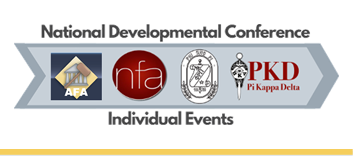Document Type
Tournament Assessments
Abstract
There has been much talk in the forensic community about frustration with events and progression of the activity. The National Forensic Association National Tournament student meeting discussed irritation with the Impromptu event saying that it has been stagnant and not providing the skills needed for application in a world outside forensics. I propose a new ballot that promotes the source and intention of the event while at the same time giving a basis for "real world" application. This would not only remind competitors and judges what the intent of the event is supposed to be but also with the constant reading of the description people will eventually have the event descriptions memorized. After a ballot analysis of every ballot that I have received from the past two years of competition, I have concluded that the notes given by most judges are certainly helpful but lack justification or reason which disregards the pedagogical value of this activity. In order to keep this activity alive we must be able to justify that this is an educational activity and this new ballot would give it additional validation. This ballot will serve as merely a guide and not a rubric.
For the two years that I have competed in collegiate forensics I have received such comments as, "Your teaser is too long," "Your argument seems weak," and "This is stupid." I look at other ballots and I am thrilled with comments such as, "You were funny" but with further inspection I come to realize that "You were funny" was the only comment made on my ballot. The previous comments and others alike came with little to no explanation or elaboration. How could so many tournaments produce so many poor ballots?
The problem of ballots with little useful feedback isn't new by any means. In fact, Kevin Jones's 1988 essay The Indi-vidual Events Ballot: Pedagogical Tool or Narcissistic Soap Box? discusses the problems and consequences that come from a "useless" or poor ballot. Seeing as Jones (1988) wrote his article over twenty years ago and the quality of ballots has not significantly improved, further discussion of effective ballot writing as well as a change to the ballot format is warranted. I believe that a ballot should not only give a competitor tips for a more successful round in the future, but it should also be used as a tool to teach students the communication concepts in which critiques are grounded. In addition, in order to keep the forensics activity alive and well funded, there must be evidence that students are not only competing to win but to learn as well. In order to keep to the task at hand, however, this paper will focus on improving the ballot rather than explaining the consequences of a poor ballot. I propose that a new standardized ballot format should be created in order to fully maximize the potential of collegiate forensics.
It is important to understand the reasoning behind my proposal so instead of just stating my idea, I will explain it to you. (See what I did there?) In order to do so, this paper will first discuss what exactly is considered a good and a poor ballot; second, the pedagogical reasoning for including the individual event description on each ballot; third, why Aristotle is still important; and finally, the appearance of the proposed ballot and what this ballot will provide for the future of forensics.
Creative Commons License

This work is licensed under a Creative Commons Attribution 4.0 International License.
Rights Statement
In Copyright https://rightsstatements.org/page/InC/1.0/?language=en
Recommended Citation
Wakefield, Bradford
(2010)
"Ballots: A New, Comprehensive and Educational Approach for Evaluating Forensic Competitors,"
Proceedings of the National Developmental Conference on Individual Events: Vol. 5:
Iss.
1, Article 8.
Available at:
https://cornerstone.lib.mnsu.edu/ndcieproceedings/vol5/iss1/8

